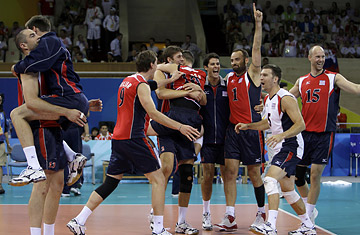
The U.S. players celebrate after winning their men's semifinal volleyball match against Russia.
If you had found yourself at Beijing's Capital Gymnasium on Friday afternoon, you might have thought you had stepped back into the Cold War. Part of it was the venue itself — a squat, concrete block of Communist architecture, an almost quaint anomaly amid the city's gleaming new sports cathedrals. Inside, the U.S. and Russian men's volleyball teams faced off for the right to play in Sunday's gold medal match. Their respective fans were whipped into states of shared hysteria and the Chinese joined in, just for the fun of it. Though relations between Washington and Moscow are worse than they have been in two decades, the atmosphere wasn't as tense as the epic U.S.-Soviet Olympic encounters of old. It just seemed that way.
The game's real storyline, though, centered around U.S. head coach Hugh McCutcheon, whose family suffered the first and only tragedy of these Games. The day after the Opening Ceremonies, the father of McCutcheon's wife Elisabeth was stabbed to death and her mother critically injured by a deranged and suicidal Chinese man at Beijing's Drum Tower. McCutheon left the team to be with his family, who flew back to the U.S. early last week. He returned on Aug. 17. Improbably and imperceptibly, the U.S. men worked its way through its draw, then beat Serbia in five sets to reach the semifinals. A win would secure the U.S. its first medal since 1992 and first shot at gold since the Seoul Games of 1988, when the Soviet Union still existed.
The U.S. raced to an early lead and won the first set, 25-22, before falling behind the Russians in the second. Down 21-19, the U.S. capitalized on Russian errors and reeled off six straight points to take the set. But the momentum had already begun to turn, and behind the mammoth outside hitters, Alexander Volkov and Maxim Mikhaylov, Russia clawed back. The U.S. staved off one set point in the third but eventually succumbed, 27-25. After taking the fourth set, 25-22, the Russian players looked ready to play four more, while the Americans slumped. Between sets, McCutcheon, whose impassive sideline demeanor belies a wiry intensity, urged his players to find a way to win. The Americans took an early lead, held off a Russian charge and finished the match by snuffing one last Mikhaylov heat-seeker. The final score was 25-22, 25-21, 25-27, 22-25, 15-13.
After the final block, McCutcheon shook hands with Russia's coach, Vladimir Alekno, then stood alone while his players celebrated. "This team represents what's good about team sports," he said, when asked what American fans who have not followed his team's run might be missing. "The sum of our parts are much greater than the individual aspects. They want to be part of something bigger than themselves. There's a lot of unity and strength to this group. I don't know if that's of any interest to Americans, but that's what they're missing." He parried a reporter's effort to get him to open up, saying that nothing in particular went through his mind when the team won. His players weren't as reticent. An ice pack taped to his back after stepping off the court, U.S. captain Tom Hoff said that when fatigue set in late in the match, he thought of his coach's family, and his teammates', and his own. "I didn't want to quit," he said. "We're playing for a lot of things."
Responding to the defeat, Alekno wished the U.S. well and remarked of his team's peformance, "I really don't have much to say." Next to him, the Russian captain wept. McCutcheon smiled wryly. The good guys moved on.
